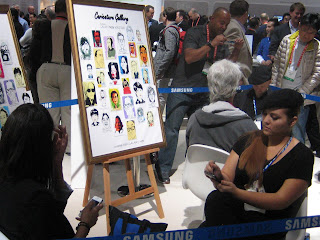1. Cats communicate by touching nose to nose.
2. A soft purr indicates contentment but a deep purr can indicate pain.
3. Cats prefer humans to communicate with them using baby talk.
4. Cats can get very sick or die from eating chocolate.
5. Although cats like to nap, hence the term "catnap", they also have deep sleeps in which they have similar sleep patterns that we have when we dream.
6. Cats blink and narrow their eyes when they accidentally make eye contact.
7. Unlike humans, cats do not understand punishment; praise is the more effective way of modifying their behaviour.
8. Cats clean their teeth by eating meat (deboned poultry or beef).
9. Originally desert dwellers, cats love the sun.
10. Scientists have not been able to determine the origin of a cat's purr; some believe it originates in the cariodvascular system rather than the throat.
Source: www.readersdigest.ca.
Photo courtesy www.a2zpetsinfo.com.
Monday, March 12, 2012
Sunday, March 11, 2012
A Baby and a Toddler
I got to cuddle with a baby this weekend. I got to read to a toddler -- the same book over and over again. It brought back lots of memories of my own children at that age. I miss the little sounds that a baby makes. I miss the wide-eyed innocence of a toddler. I miss kissing a baby's belly and hearing him laugh. I miss holding a toddler's hand as we walk down the street. I miss playing "A Lady Went to Market" as I bounce a baby on my knee. I miss the pure heart of a toddler: "I love you, Aunty Linda." I miss closing your eyes and almost falling asleep as a baby falls asleep against your chest. Or kissing a toddler between the bars of the bannister railing. I miss putting a tuque on a baby. Or zipping up a toddler's coat. I miss teaching a baby a new word. Or trying to decipher the words of a toddler -- although my nephew speaks quite clearly for the most part. I miss singing a lullaby to a baby. Or listening to a toddler sing. I miss watching a baby bounce. Or watching a toddler bounce a ball. I miss the smell of baby powder when I change a baby's diaper. I miss the cheer a toddler lets out when he goes on the potty rather than in his pants. I miss taking a baby for a walk. Or a toddler asking if you want to go for a ride with him in his "double-double stroller". Thank you to my nephews Bo and Mason for a fun weekend. It was a great learning experience. I love you!
Saturday, March 10, 2012
Big Ben
As we turn the clocks forward one hour tonight, let's look at what one survey calls the most popular landmark in London, England -- Big Ben. The tower clock, located at the Westminster Palace on the River Thames, first started ticking on May 31, 1859, when Victorian London's population sat at a mere 2 million (it would double by 1900). Named after Sir Benjamin Hall who installed the giant bell inside the tower, Big Ben is the largest four faced chiming clock in the world. During World War I, for two years, the clock chimes were silenced and the clock face was darkened to prevent German zeppelin attacks. I assume that the clock face was also darkened during the London Blitz in 1940 and 1941. Apparently, though, the clock continued to chime despite having its dials damaged by a Luftwaffe raid. On New Year's Eve 1962, ice and snow built up on the pendulum which detached itself from the rest of the clock, thereby preventing damage: Big Ben rang in the New Year ten minutes late. Its one and only major breakdown took place in 1976 and required 26 days of repairs. Big Ben has been featured in several movies including James Bond's "Thunderball". Today, Big Ben continues to tick on cue. Apparently, if Londoners request a tour from their Member of Parliament, they can tour the tower by climbing its over 300 steps.
Photo courtesy http://uploadwikimedia.org.
Photo courtesy http://uploadwikimedia.org.
Friday, March 9, 2012
Bring Back Mrs. Bunker!
Photo of Housewives of Atlanta courtesy www.freddyo.com.
I heard tonight that a new reality TV show is premiering soon called "The Housewives of the Trailer Park". We can already tune in to The Housewives of Atlanta, Orange County, Beverly Hills, New Jersey and Lorne Park, to name a few. Haven't we had enough of the housewives? Haven't we had enough of reality TV?
Whatever happened to lighthearted TV? Or how about historical programming? We used to watch TV to get away from our problems; now we watch TV to hear about other people's problems. TV used to be innocent. Now it has to be so hard-edged. Rather than shows like Murder She Wrote which focused on solving the mystery, we have murder shows which glorify death.
Whatever happened to characters that had flaws but also redeeming qualities? Now we have characters which have nothing but flaws; they are people that we have a hard time liking. They are completely interested in themselves and no one else. They spout lines to get a laugh out of the audience, but they are not genuine or believable.
I miss classic TV shows like "Little House on the Prairie" and "Happy Days" and "All in the Family". These programs had a simplicity and a genuineness that today's shows lack. I would take Mrs. Ingalls or Mrs. Cunningham or Mrs. Bunker any day over "The Housewives of Atlanta".
Photo of All in the Family's Mrs. Bunker and Mr. Bunker courtesy http://tvseriesfinale.com.
Thursday, March 8, 2012
Lasagna vs. Lemon Chicken
Many episodes of "Everybody Loves Raymond" are built around food. Ray's mother, Marie, spends much of her time in the kitchen preparing Italian dishes like lasagna, meatballs, etc. Everything Marie makes is delicious. She loves to fuss over her son, Ray, making him his favourite dishes. However, Ray's wife Debra, is not interested in cooking. Her trademark dish, lemon chicken, is passable at best. Everyone cringes when they know Debra is preparing the meal. Marie criticizes Debra's cooking every chance she gets. She raids her fridge, purging it of dishes which have turned into science experiments. This makes for great comedy.
We are introduced to Debra's lemon chicken in the very first episode, as she prepares it for Ray on their first date, and he claims that it is so good, he could eat it forever. Be careful what you wish for!
Episode 15, titled "Turkey or Fish" is based on the Barone's Thanksgiving dinner. Debra wants to create her own tradition and suggests they serve fish. Marie, on the other hand, will not bend, insisting on bringing a golden turkey, roasted to perfection to her daughter-in-law's house. Marie's husband Frank ends up choking on some food and Marie won't rest until she proves that it was Debra's fish, not her turkey. Surprisingly, however, Frank likes the fish so much he asks for more!
In Episode 37, called "Marie's Meatballs" Marie dusts off her box of precious recipes from her mother and shares the meatball one with Debra, giving her a personal cooking class. Then Ray tastes the meatballs and claims that they are not as good as his mom's. Debra will not rest until she finds out what went wrong. It turns out that Marie sabotaged the recipe by pasting a basil label on a bottle of tarragon.
In Episode 57, titled "No Fat" Marie is diagnosed with high cholesterol and decides to cook a fat-free Thanksgiving dinner, serving a tofu turkey. Everyone is disappointed and refuses to eat it; Ray even orders a real turkey from a restaurant. In the end, Marie relents and sneaks into the kitchen that night to steal some of the turkey.
In Episode 91, called "Debra Makes Something Good" everyone is astonished at how good Debra's braciole tastes. Marie declares war, determined to prove to her family that she is still the best cook.
In Episode 146, titled "The First Time" Marie and Debra have been feuding for three episodes straight. In an attempt to patch things up, Marie bakes a chocolate cake and writes on it "I'M SORRY". Ray never tells Debra about the cake, which ends up back at Marie's house, where Ray, Robert and Frank devour it. Once again, Marie's cooking is irresistible.
In Episode 206, called "Tasteless Frank", Marie is distraught because for the first time Frank is over the moon about her cooking. He is adding salt to all of her dishes which she considers to be the ultimate insult. It turns out that he has started a new medication that he doesn't want her to know about. The problem is resolved when Frank chooses to stop taking his medication and he gets his taste back. Marie is relieved!
Marie became synonymous with good cooking. In fact, Doris Roberts, who plays Marie wrote the autobiography Are You Hungry, Dear?: Life, Laughs and Lasagna, which includes some of her famous recipes.
Photo courtesy http://sharetv.org/images/guide.
We are introduced to Debra's lemon chicken in the very first episode, as she prepares it for Ray on their first date, and he claims that it is so good, he could eat it forever. Be careful what you wish for!
Episode 15, titled "Turkey or Fish" is based on the Barone's Thanksgiving dinner. Debra wants to create her own tradition and suggests they serve fish. Marie, on the other hand, will not bend, insisting on bringing a golden turkey, roasted to perfection to her daughter-in-law's house. Marie's husband Frank ends up choking on some food and Marie won't rest until she proves that it was Debra's fish, not her turkey. Surprisingly, however, Frank likes the fish so much he asks for more!
In Episode 37, called "Marie's Meatballs" Marie dusts off her box of precious recipes from her mother and shares the meatball one with Debra, giving her a personal cooking class. Then Ray tastes the meatballs and claims that they are not as good as his mom's. Debra will not rest until she finds out what went wrong. It turns out that Marie sabotaged the recipe by pasting a basil label on a bottle of tarragon.
In Episode 57, titled "No Fat" Marie is diagnosed with high cholesterol and decides to cook a fat-free Thanksgiving dinner, serving a tofu turkey. Everyone is disappointed and refuses to eat it; Ray even orders a real turkey from a restaurant. In the end, Marie relents and sneaks into the kitchen that night to steal some of the turkey.
In Episode 91, called "Debra Makes Something Good" everyone is astonished at how good Debra's braciole tastes. Marie declares war, determined to prove to her family that she is still the best cook.
In Episode 146, titled "The First Time" Marie and Debra have been feuding for three episodes straight. In an attempt to patch things up, Marie bakes a chocolate cake and writes on it "I'M SORRY". Ray never tells Debra about the cake, which ends up back at Marie's house, where Ray, Robert and Frank devour it. Once again, Marie's cooking is irresistible.
In Episode 206, called "Tasteless Frank", Marie is distraught because for the first time Frank is over the moon about her cooking. He is adding salt to all of her dishes which she considers to be the ultimate insult. It turns out that he has started a new medication that he doesn't want her to know about. The problem is resolved when Frank chooses to stop taking his medication and he gets his taste back. Marie is relieved!
Marie became synonymous with good cooking. In fact, Doris Roberts, who plays Marie wrote the autobiography Are You Hungry, Dear?: Life, Laughs and Lasagna, which includes some of her famous recipes.
Photo courtesy http://sharetv.org/images/guide.
Wednesday, March 7, 2012
The Force of Facebook
For a long time I resisted going on Facebook. I heard about teenagers bullying other teenagers on there. I heard about people giving a blow by blow account of their day ex. at 12:00 noon I sneezed. Why would I want to waste my time on Facebook? However, a writer friend told me that it is a great way to connect with other writers. So, I made the leap and joined up. I hoped to be a force for good on Facebook.
Apparently, there are more Facebook followers today than there were humans on the earth 200 years ago. Seven hundred and fifty million followers belong to Facebook. It is an almost instantaneous way to connect with people all around the world. Videos are posted daily on Facebook; my son Thomas directed me to one in particular that he shared on his Facebook page today.
The video is called "Kony 2012". An American man named Jason Russell has had a mission for the past eight years to educate the public about a man named Joseph Kony, leader of "The Lord's Resistance Army" in Uganda, who kidnaps African children, arms them with guns, and has them kill, for no other cause than his own glory. The videographer met a boy named Jacob whose brother was killed by the LRA; Jacob's story pulled so much at his heartstrings that he vowed he would do something to help him.
Jason Russell formed a group called "Invisible Children" to campaign on the behalf of these kidnapped children. Although the LRA leader Joseph Kony is number 1 on the International Criminal Court's hit list, many people have never heard of him. The American videographer made it his mission to make him more famous than a Hollywood celebrity. He tried to get the United States government on board for years, but they were not interested given that no Americans were being kidnapped or killed. So the videographer turned to Facebook to spread the word; bit by bit the Invisible Children website has built up a following.
Because the American public became concerned about the LRA, President Obama wrote a letter committing US advisors to help the children of Uganda. However, the Lord's Resistance Army still operates and their leader still hides in the jungle. Jason Russell fears that it will be a long process and does not want them to pull out before their work is complete.
And so the American made a video to promote awareness and gain support for his cause. In the past 24 hours, the video has received over 15 million hits: that's close to half the population of Canada! The videographer hopes to keep up his public campaign, culminating on April 20, 2012 with a "Cover the Night" event where KONY 2012 posters will litter neighbourhoods across the United States.
My hat's off to Jason Russell -- how one person is trying to change the lives of thousands of people. Rather than sitting back and saying there is nothing we can do, he is acting. Of course, there will always be critics who think there is a better way to do things. However, people wondered why so many knew about the killing of the Jews in Germany and German occupied countries during World War II and did nothing to stop it (although some individuals did speak out like Lutheran pastor Dietrich Bonhoeffer). How can we sit back and do nothing knowing that the LRA is terrorizing tens of thousands of people, especially children?
I pray that the Invisibile Children fights this evil army and I pray that their leader is captured. Someone has to stand up for good. Someone has to stand up for the truth. Someone has to stand up for the 30,000 plus African children who have who been kidnapped and/or murdered. Jason Russell is doing just that, in large part thanks to the force of Facebook.
If you are interested in the "KONY 2012" video, here is a link:
www.invisiblechildren.com/videos
Apparently, there are more Facebook followers today than there were humans on the earth 200 years ago. Seven hundred and fifty million followers belong to Facebook. It is an almost instantaneous way to connect with people all around the world. Videos are posted daily on Facebook; my son Thomas directed me to one in particular that he shared on his Facebook page today.
The video is called "Kony 2012". An American man named Jason Russell has had a mission for the past eight years to educate the public about a man named Joseph Kony, leader of "The Lord's Resistance Army" in Uganda, who kidnaps African children, arms them with guns, and has them kill, for no other cause than his own glory. The videographer met a boy named Jacob whose brother was killed by the LRA; Jacob's story pulled so much at his heartstrings that he vowed he would do something to help him.
Jason Russell formed a group called "Invisible Children" to campaign on the behalf of these kidnapped children. Although the LRA leader Joseph Kony is number 1 on the International Criminal Court's hit list, many people have never heard of him. The American videographer made it his mission to make him more famous than a Hollywood celebrity. He tried to get the United States government on board for years, but they were not interested given that no Americans were being kidnapped or killed. So the videographer turned to Facebook to spread the word; bit by bit the Invisible Children website has built up a following.
Because the American public became concerned about the LRA, President Obama wrote a letter committing US advisors to help the children of Uganda. However, the Lord's Resistance Army still operates and their leader still hides in the jungle. Jason Russell fears that it will be a long process and does not want them to pull out before their work is complete.
And so the American made a video to promote awareness and gain support for his cause. In the past 24 hours, the video has received over 15 million hits: that's close to half the population of Canada! The videographer hopes to keep up his public campaign, culminating on April 20, 2012 with a "Cover the Night" event where KONY 2012 posters will litter neighbourhoods across the United States.
My hat's off to Jason Russell -- how one person is trying to change the lives of thousands of people. Rather than sitting back and saying there is nothing we can do, he is acting. Of course, there will always be critics who think there is a better way to do things. However, people wondered why so many knew about the killing of the Jews in Germany and German occupied countries during World War II and did nothing to stop it (although some individuals did speak out like Lutheran pastor Dietrich Bonhoeffer). How can we sit back and do nothing knowing that the LRA is terrorizing tens of thousands of people, especially children?
I pray that the Invisibile Children fights this evil army and I pray that their leader is captured. Someone has to stand up for good. Someone has to stand up for the truth. Someone has to stand up for the 30,000 plus African children who have who been kidnapped and/or murdered. Jason Russell is doing just that, in large part thanks to the force of Facebook.
If you are interested in the "KONY 2012" video, here is a link:
www.invisiblechildren.com/videos
Photo courtesy www.enoughproject.org.
Tuesday, March 6, 2012
The Peace That Passeth All Understanding
Do not be anxious about anything, but in everything, by prayer and petition, with thanksgiving, present your requests to God. And the peace of God, which passeth all understanding, shall guard your hearts and minds through Christ Jesus. (Phillipians 4:7)
Today at Bible Study we talked about the above passage. What images or moments give us a sense of peace? Here is a list of images which evoke peace:
1. the lull of the waves
2. the warmth of sunshine
3. softly falling snowflakes
4. a field of swaying wildflowers
5. a sleeping baby
6. a hug from a child
7. a sunrise
8. a sunset, especially over the water
9. a full moon, especially a harvest moon
10. a starry night
11. trees ablaze in autumn
12. trees blossoming in spring
13. mountain peaks
14. the purr of a cat
15. the hum of crickets
16. a gospel choir
17. a friend's smile
18 a long walk in the woods or along the beach
19. the satisfaction of helping others
20 being grateful for God's blessings
May you have God's peace today and everyday!
Photo courtesy http://farm4.static.flickr.com.
Today at Bible Study we talked about the above passage. What images or moments give us a sense of peace? Here is a list of images which evoke peace:
1. the lull of the waves
2. the warmth of sunshine
3. softly falling snowflakes
4. a field of swaying wildflowers
5. a sleeping baby
6. a hug from a child
7. a sunrise
8. a sunset, especially over the water
9. a full moon, especially a harvest moon
10. a starry night
11. trees ablaze in autumn
12. trees blossoming in spring
13. mountain peaks
14. the purr of a cat
15. the hum of crickets
16. a gospel choir
17. a friend's smile
18 a long walk in the woods or along the beach
19. the satisfaction of helping others
20 being grateful for God's blessings
May you have God's peace today and everyday!
Photo courtesy http://farm4.static.flickr.com.
Monday, March 5, 2012
The Iron Curtain Speech
 |
| Photo courtesy www.kingsacademy.com. |
"From Stettin in the Baltic to Trieste in the Adriatic, an iron curtain has descended across the [European] Continent."
On March 5, 1946, a train with two World War II statesmen left Washington D.C. and steamed across the United States to the gateway to the west, Missouri. In the town of Fulton, population 7,000, at Westminster University, former British Prime Minister Winston Churchill, with President Harry Truman by his side, delivered a prophetic speech to an audience of 40,000 students. Titled "The Sinews of Peace" the oratory soon became known as "The Iron Curtain Speech", referring to the figurative curtain that had fallen, separating democratic western Europe and Communist Eastern Europe.
Sir Winston Churchill reminded the American audience what had happened when the world powers appeased Hitler, granting him Austria, the Sudetenland, and Czechoslovakia; finally Poland was the straw that broke the camel's back. Churchill feared that if the world powers appeased Stalin, he would never be satisfied either.
The British statesman pointed out that the famous capitals of Warsaw, Berlin, Prague, Vienna, Budapest, Belgrade, Bucharest and Sofia were under the ever increasing control of Moscow. For instance, he mentioned that:
The Russian-dominated Polish Government has been encouraged to make enormous and wrongful inroads upon Germany, and mass expulsions of millions of Germans on a scale grievous and undreamed-of are now taking place.
In fact, the Soviet Union would expell two out of the three million Germans in Germany's eastern provinces in the years 1945 to 1948, in the name of ethnic cleansing.
Reminding the audience that the United States was at a "pinnacle of power", Churchill called for even closer relations between Britain and America, in an effort to counter the rising menace of Communism. Surprisingly, though, the speech was not well received by political figures like former First Lady Eleanor Roosevelt, former Vice President Henry Wallace and then current British Prime Minister Clement Atlee. The New York Herald Tribune disagreed with the tone and content of the speech.
However, within weeks of Churchill's delivery of his speech, public opinion shifted: more and more people realized that the Soviet Union posed a threat that could not be ignored. Although World War II had ended, the Cold War had begun, marked by Sir Winston Churchill's famous oratory. The Iron Curtain had descended, not to be raised for almost 45 years.
Map of Iron Curtain circa 1946 courtesy http://4.bp.blogspot.com.
Getting ready for sweden
Love THE handlebars and front end. I'm going to make the bars more narrow. Just enough for the necessary controls!
Thanks gielus en rene!
Thanks gielus en rene!
Sunday, March 4, 2012
The Lorax
My husband Rob's favourite book to borrow from the library in elementary school was Dr. Seuss' The Lorax. Today we took our kids to the theatre to see the new movie "The Lorax". As in the book, in the movie the Once-ler has knocked down all of the trees to make his thneeds. The town of Thneedville is left treeless and therefore has no oxygen, relying on Mayor O'Hare to sell bottles of it. A young girl named Audrey paints pictures of trees, dreaming of having just one tree in her yard. Ted, who has a crush on Audrey, makes it his life's mission to find a tree for her. He tracks down the hermit-like Onceler who tells him the story of how Thneedville became treeless. He then gives Ted the seed from the last truffula tree, which he plants, despite opposition from Mayor O'Hare. In the end, hills surrounding Thneedville are littered with new trees and everyone lives happily ever after.
The story of The Lorax made me think about our cities today. Do we have enough trees in our cities to produce adequate air? I know New York City has fresh air programs where inner city kids can spend a few weeks in the summer with a fresh air friend in upper state New York. Although New York City seems to have a lot of trees, I suspect that many of these are in Central Park, not in the inner city. According to a recent American study, urban areas in the U.S. are losing 4 million trees per year. Twenty cities were studied, with Atlanta at the top of the charts with 53.9 % tree cover, while Denver was at the bottom, with only 9.6% tree cover. Of course, results varied depending on which part of the city was focussed on. One study cited that East Boston had less than 5% tree cover and South Boston had only 2% tree cover.
As for Canadian cities, I could not find many statistics for them. One site claimed that Toronto only had 17% urban tree coverage. I am assuming that Hamilton is better than Toronto for trees. If one stands at the edge of the escarpment in Hamilton and looks out over the downtown, one sees a sea of green. As for London, Ontario, its nickname is the "Forest City" -- is that a misnomer?
It's easy to take our trees for granted, at least until we don't have them anymore. Thank you, Dr. Seuss, for pointing that out to us.
Photo courtesy http://i.usatoday.net/life.
The story of The Lorax made me think about our cities today. Do we have enough trees in our cities to produce adequate air? I know New York City has fresh air programs where inner city kids can spend a few weeks in the summer with a fresh air friend in upper state New York. Although New York City seems to have a lot of trees, I suspect that many of these are in Central Park, not in the inner city. According to a recent American study, urban areas in the U.S. are losing 4 million trees per year. Twenty cities were studied, with Atlanta at the top of the charts with 53.9 % tree cover, while Denver was at the bottom, with only 9.6% tree cover. Of course, results varied depending on which part of the city was focussed on. One study cited that East Boston had less than 5% tree cover and South Boston had only 2% tree cover.
As for Canadian cities, I could not find many statistics for them. One site claimed that Toronto only had 17% urban tree coverage. I am assuming that Hamilton is better than Toronto for trees. If one stands at the edge of the escarpment in Hamilton and looks out over the downtown, one sees a sea of green. As for London, Ontario, its nickname is the "Forest City" -- is that a misnomer?
It's easy to take our trees for granted, at least until we don't have them anymore. Thank you, Dr. Seuss, for pointing that out to us.
Photo courtesy http://i.usatoday.net/life.
Saturday, March 3, 2012
The Miracle Worker
W-A-T-E-R signed Anne Sullivan into the hand of Helen Keller, a six year old girl who was blind and deaf. Then she held Helen's hand under the water pump so that she would associate the word with the thing that it represented. All of a sudden, Helen had an "Aha!" moment as she realized that the two were interconnected. "Wa-wa!" she said. For the first time in several years, the young girl had spoken. The "Miracle Worker" had perfomred her magic.
Anne Sullivan was born in 1866 in Massachusetts. As a child she suffered an infection which led to blindness. Anne enrolled at the Perkins Institute for the Blind where she learned the manual alphabet. On March 3, 1887, Anne arrived at Ivy Green, the Keller's Alabama home, to tutor Helen, on the recommendation of the Perkins Institute. Mr. and Mrs. Keller had sought the advice of Alexander Graham Bell, who worked with the deaf, about their daughter and he had recommended the Institute.
Finding the young blind and deaf girl quite strong-willed and uncontrollable, Anne spent the first few weeks socializing and disciplining her. In time, the teacher gained her pupil's trust and the relationship blossomed. The first gift that Anne gave Helen was a D-O-L-L which she signed into her hand. One by one Miss Sullivan spelled out words into the young girl's hand. At first the task seemed futile. However, by that April, the breakthrough would take place when Helen would realize that these letters that Anne was signing into her hand represented the objects that she handed her.
Anne went on to teach Helen not only sign language but also Braille and lip-reading (using her hands). She also taught Helen how to speak by putting her hand against her throat so that Helen could feel the vibrations of her voice box. By 1894, Helen and Anne moved to New York City where the former enrolled in the Wright-Humason School for the Deaf. Two years later Helen attended the Cambridge School for Young Ladies. She was the first blind and deaf student to graduate from Radcliff College in 1904. Anne was always by Helen's side as she attended classes at all three schools.
Helen became an author (The Story of My Life) and a public speaker. She campaigned as a suffragette and a pacifist. She met famous people like Charlie Chaplin and Mark Twain and every American President from Grover Cleveland to Lyndon Johnson.
Anne and Helen remained lifelong companions unil the former's death in 1936, As Helen explained: "I would rather walk with a friend in the dark than alone in the light."
Photo courtesy http://blog.educaedu.com.
Anne Sullivan was born in 1866 in Massachusetts. As a child she suffered an infection which led to blindness. Anne enrolled at the Perkins Institute for the Blind where she learned the manual alphabet. On March 3, 1887, Anne arrived at Ivy Green, the Keller's Alabama home, to tutor Helen, on the recommendation of the Perkins Institute. Mr. and Mrs. Keller had sought the advice of Alexander Graham Bell, who worked with the deaf, about their daughter and he had recommended the Institute.
Finding the young blind and deaf girl quite strong-willed and uncontrollable, Anne spent the first few weeks socializing and disciplining her. In time, the teacher gained her pupil's trust and the relationship blossomed. The first gift that Anne gave Helen was a D-O-L-L which she signed into her hand. One by one Miss Sullivan spelled out words into the young girl's hand. At first the task seemed futile. However, by that April, the breakthrough would take place when Helen would realize that these letters that Anne was signing into her hand represented the objects that she handed her.
Anne went on to teach Helen not only sign language but also Braille and lip-reading (using her hands). She also taught Helen how to speak by putting her hand against her throat so that Helen could feel the vibrations of her voice box. By 1894, Helen and Anne moved to New York City where the former enrolled in the Wright-Humason School for the Deaf. Two years later Helen attended the Cambridge School for Young Ladies. She was the first blind and deaf student to graduate from Radcliff College in 1904. Anne was always by Helen's side as she attended classes at all three schools.
Helen became an author (The Story of My Life) and a public speaker. She campaigned as a suffragette and a pacifist. She met famous people like Charlie Chaplin and Mark Twain and every American President from Grover Cleveland to Lyndon Johnson.
Anne and Helen remained lifelong companions unil the former's death in 1936, As Helen explained: "I would rather walk with a friend in the dark than alone in the light."
Photo courtesy http://blog.educaedu.com.
Friday, March 2, 2012
More Crazy Laws
26. In
27. In
28. In
29. In
30. In
31. In
32. In
33. In
34. In
35. In
36.
37. In Myrtle Creek,
38. In Danville, Pennsylvania: All fire hydrants must be checked one hour before all fires.
39. In
40. On Hilton Head Island, South Carolina it is illegal to shine a flashlight on a sea turtle.
41. In
42. In
44. In
45. In
46. In Newport, Virginia it's against the law to tickle a girl under her chin with a feather duster in order to get her attention.
47. In
48. In
49. In
50.
Image courtesy http://a1.phobos.apple.com/.
Thursday, March 1, 2012
No Donkeys in the Bathtub, No Lions at the Theatre
I discovered some crazy laws from America's past, some of which may still be on the books:
1. InAlabama
2. InAlaska
3. InArizona
4. InArkansas
5. A regulation inSan Francisco , California
6. InColorado 7 pm .
7. InConnecticut
8. InDelaware
9. In Washington D.C. it is illegal to post a notice in public which calls another person a 'coward' for refusing to accept a challenge to duel.
10. InFlorida 6 pm on Thursdays.
11. InGeorgia
12. InHawaii
13. InIdaho
14. A state law inIllinois
15. InSouth Bend Indiana
16. InIowa
17. InNatoma , Kansas
18. InKentucky
19. InLouisiana
20. InMaine
21. Gypsies should steer clear of Caroline County, Maryland where it's a $100 fine or six months in the can for "forecasting or pretending to foretell the future."
22. InMassachusetts
23. InMichigan
24. InMinnesota
25. InMississippi
Book cover for Crazy Laws (abridged from The Trenton Pickle Ordinance by Dick Hyman) courtesy http://ia700807.us.archive.org.
Source: www.bored.com/crazylaws.
1. In
2. In
3. In
4. In
5. A regulation in
6. In
7. In
8. In
9. In Washington D.C. it is illegal to post a notice in public which calls another person a 'coward' for refusing to accept a challenge to duel.
10. In
11. In
12. In
13. In
14. A state law in
15. In
16. In
17. In
18. In
19. In
20. In
21. Gypsies should steer clear of Caroline County, Maryland where it's a $100 fine or six months in the can for "forecasting or pretending to foretell the future."
22. In
23. In
24. In
25. In
Book cover for Crazy Laws (abridged from The Trenton Pickle Ordinance by Dick Hyman) courtesy http://ia700807.us.archive.org.
Source: www.bored.com/crazylaws.
Wednesday, February 29, 2012
I'd Rather Play a Maid than Be a Maid
Dressed in a beautiful gown, her hair trimmed with gardenias, her face beaming, Hattie McDaniel arrived at the Cocoanut Grove in Los Angeles' Ambassador Hotel on February 29, 1940 for the Twelfth Academy Awards. That night she would make history by becoming the first black actress to receive an Oscar for a supporting role in the film "Gone with the Wind". Ironically, she and her guest sat at a table for two, separated from the other guests due to their skin colour. Nonetheless, Miss McDaniel was thrilled to be given the role and the award stating that she "would rather play a maid than be a maid".
Born in Kansas in 1895 to a Civil War veteran father and a gospel singer mother, Hattie and her family moved to Colorado when she was young. She attended elementary and high school there, but then left school to hone her skills as a singer, songwriter, actress and comedienne. Hattie was the first black woman to sing on American Radio. She and her brother participated in a minstrel show in the 1920's. Hattie then moved to Hollywood where she found work on The Optimistic Do-Nut Hour on radio.
Her film debut in "The Golden West" took place in 1932. Starring in almost 40 films in the 1930's, Hattie almost always played a maid or a cook. The N.A.A.C.P. criticized her for perpetuating black stereotypes even down to the "Negro dialect" that she used when she delivered her lines. However, to her credit, Hattie usually turned these maids into "sassy, independent" characters.
In 1939, the role of the lifetime presented itself to her when she auditioned for Margaret Mitchell's "Gone with the Wind". Although the competition was almost as stiff for the "Mammy" (a former slave turned maid) role as for the "Scarlet O'Hara" (Southern debutante) role, Hattie still aced the audition, arriving in a proper maid's uniform and delivering flawless lines. Everyone remembers the famous scene, now depicted on collective plates, of Mammy tightening Scarlet's girdle as the latter holds on to the bedpost. Gone with the wind is the highest grossing movie of all time and won Oscars for best picture, director, screenplay, cinematography, art direction, film editing and best actress, among others.
Hattie went on to make many other movies, but it was impossible to top "Gone with the Wind". She remained friends with Clark Gable, who had played "Rhett Butler", and he attended parties at her house every year. Although she was married four times, each union was shortlived and childless. She passed away of breast cancer in 1952.
Note: I found an excellent poem on the Internet by poet Rita Dove.
HATTIE MCDANIEL ARRIVES AT THE COCONUT GROVE*
late, in aqua and ermine, gardenias
scaling her left sleeve in a spasm of scent,
her gloves white, her smile chastened, purse giddy
with stars and rhinestones clipped to her brilliantined hair,
on her free arm that fine Negro,
Mr. Wonderful Smith.
It's the day that isn't, February 29th,
at the end of the shortest month of the year—
and the [dullest] too, everywhere
except Hollywood, California
where the maid can wear mink and still be a maid,
bobbing her bandaged head and cursing
the white folks under her breath as she smiles
and shoos their silly daughters
in from the night dew…what can she be
thinking of, striding into the ballroom
where no black face has ever showed itself
except above a serving tray?
Hi-Hat Hattie, Mama Mac, Her Haughtiness,
The "little lady" from Showboat whose name
Bing forgot, Beulah & Bertha & Malena
& Carrie & Violet & Cynthia & Fidelia,
one half of the dark Barrymores—
dear Mammy, we can't help but hug you crawl into
your generous lap tease you
with such arch innuendo so we can feel that
much more wicked and youthful
and sleek but oh what
we forgot: the four husbands, the phantom
pregnancy, your famous parties, your celebrated
ice box cake. Your giggle above the red petticoat's rustle,
black girl and white girl walking hand in hand
down the railroad tracks
in Kansas city, six years old.
The man who advised you, now
that you were famous to 'begin eliminating"
your more common acquaintances
and your reply (catching him square
in the eye): "That's a good idea.
I'll start right now by eliminating you."
Is she or isn't she? Three million dishes,
a truckload of aprons and headrags later, and here
you are: poised, between husbands
and factions, no corset wide enough
to hold you in, your huge face a dark moon split
by that spontaneous smile – your trademark,
your curse. Not matter, Hattie: It's a long, beautiful walk
into that flower-smothered standing ovation,
so go on
and make them wait.
Rita Dove
*First published in the New Yorker magazine on May 10, 2004.
Photo of Vivien Leigh and Hattie McDaniel in "Gone with the Wind" courtesy http://classicmoviestills.com.
Born in Kansas in 1895 to a Civil War veteran father and a gospel singer mother, Hattie and her family moved to Colorado when she was young. She attended elementary and high school there, but then left school to hone her skills as a singer, songwriter, actress and comedienne. Hattie was the first black woman to sing on American Radio. She and her brother participated in a minstrel show in the 1920's. Hattie then moved to Hollywood where she found work on The Optimistic Do-Nut Hour on radio.
Her film debut in "The Golden West" took place in 1932. Starring in almost 40 films in the 1930's, Hattie almost always played a maid or a cook. The N.A.A.C.P. criticized her for perpetuating black stereotypes even down to the "Negro dialect" that she used when she delivered her lines. However, to her credit, Hattie usually turned these maids into "sassy, independent" characters.
In 1939, the role of the lifetime presented itself to her when she auditioned for Margaret Mitchell's "Gone with the Wind". Although the competition was almost as stiff for the "Mammy" (a former slave turned maid) role as for the "Scarlet O'Hara" (Southern debutante) role, Hattie still aced the audition, arriving in a proper maid's uniform and delivering flawless lines. Everyone remembers the famous scene, now depicted on collective plates, of Mammy tightening Scarlet's girdle as the latter holds on to the bedpost. Gone with the wind is the highest grossing movie of all time and won Oscars for best picture, director, screenplay, cinematography, art direction, film editing and best actress, among others.
Hattie went on to make many other movies, but it was impossible to top "Gone with the Wind". She remained friends with Clark Gable, who had played "Rhett Butler", and he attended parties at her house every year. Although she was married four times, each union was shortlived and childless. She passed away of breast cancer in 1952.
Note: I found an excellent poem on the Internet by poet Rita Dove.
HATTIE MCDANIEL ARRIVES AT THE COCONUT GROVE*
late, in aqua and ermine, gardenias
scaling her left sleeve in a spasm of scent,
her gloves white, her smile chastened, purse giddy
with stars and rhinestones clipped to her brilliantined hair,
on her free arm that fine Negro,
Mr. Wonderful Smith.
It's the day that isn't, February 29th,
at the end of the shortest month of the year—
and the [dullest] too, everywhere
except Hollywood, California
where the maid can wear mink and still be a maid,
bobbing her bandaged head and cursing
the white folks under her breath as she smiles
and shoos their silly daughters
in from the night dew…what can she be
thinking of, striding into the ballroom
where no black face has ever showed itself
except above a serving tray?
Hi-Hat Hattie, Mama Mac, Her Haughtiness,
The "little lady" from Showboat whose name
Bing forgot, Beulah & Bertha & Malena
& Carrie & Violet & Cynthia & Fidelia,
one half of the dark Barrymores—
dear Mammy, we can't help but hug you crawl into
your generous lap tease you
with such arch innuendo so we can feel that
much more wicked and youthful
and sleek but oh what
we forgot: the four husbands, the phantom
pregnancy, your famous parties, your celebrated
ice box cake. Your giggle above the red petticoat's rustle,
black girl and white girl walking hand in hand
down the railroad tracks
in Kansas city, six years old.
The man who advised you, now
that you were famous to 'begin eliminating"
your more common acquaintances
and your reply (catching him square
in the eye): "That's a good idea.
I'll start right now by eliminating you."
Is she or isn't she? Three million dishes,
a truckload of aprons and headrags later, and here
you are: poised, between husbands
and factions, no corset wide enough
to hold you in, your huge face a dark moon split
by that spontaneous smile – your trademark,
your curse. Not matter, Hattie: It's a long, beautiful walk
into that flower-smothered standing ovation,
so go on
and make them wait.
Rita Dove
*First published in the New Yorker magazine on May 10, 2004.
Photo of Vivien Leigh and Hattie McDaniel in "Gone with the Wind" courtesy http://classicmoviestills.com.
Tuesday, February 28, 2012
If Saddlebags Could Talk
"[The circuit rider] went through storms of wind, hail, snow, and rain; climbed hills and mountains, traversed valleys, plunged through swamps, swollen streams, lay out all night, wet, weary, and hungry, held his horse by the bridle all night, or tied him to a limb, slept with his saddle blanket for a bed, his saddle-bags for a pillow. Often he slept in dirty cabins, ate roasting ears for bread, drank butter-milk for coffee; took deer or bear meat, or wild turkey, for breakfast, dinner, and supper. This was old-fashioned Methodist preacher fare and fortune."*
John Wesley, the first circuit rider and the father of Methodism, was born in 1703 in England. The son of a rector, he grew up in the Anglican church. Attending Oxford University, John, his brother Charles and their friend George Whitefield, started the Holy Club, a Christian group. John and George started preaching in Anglican churches, but were not well received given their message: live your life according to the method laid down in the Bible. They believed that the Holy Spirit converts souls to Christianity and that we should strive for Christian "perfection", keeping our hearts pure. George was a dynamic preacher and when London's Anglican churches banned him, he held an open air service in the small town of Kingswood. John followed suit and attracted an audience of 3000 on his second attempt.
These open air services, or "field preaching" led to circuit riding. John Wesley took his horse, loaded his saddlebags and set out for his charges. Sometimes he faced angry mobs who tried to break up his meetings; sometimes he was stoned or beaten. Yet the Holy Spirit filled him with a fire to spread God's word: he was unstoppable. He travelled England's countryside for forty years, covering a quarter of a million miles, preaching 42,000 sermons, giving away 30,000 pounds. He also wrote 200 books and hundreds of hymns.
On this day in 1784, John Wesley chartered the first Methodist church in the United States. He had felt that after the American Revolution a decade before, English Anglicans had abandonned their American counterparts. With his own brand of Christianity, he tried to fill that spiritual void. He ordained Dr. Thomas Coke who went on to ordain Francis Asbury.
The latter continued Wesley's tradition of circuit riding in America. Circuit riders with small territories had three or four churches to visit, but riders with big circuits had to cover 300 miles. They were poorly paid, persecuted, and had little time to rest; in fact, some had to read the Bible while on horseback to prepare their sermons. Marriage was frowned upon for circuit riders and life on the road was lonely. Half of them died before the age of 33 due to the harsh conditions and unrealistic expectations.
Yet despite their struggles, circuit riders sparked a hunger for Christianity in America. By 1800, tent revivals sprung up in the Appalachians, the first meeting being held in Kentucky and attracting 10,000 people. These tent revivals led to more congregations forming which led to more churches being built. The circuit riders gave a great contribution to Methodism and to Christianity in North America (Canada also had circuit riders). And it all started with a young man named John Wesley.
*Source: "Circuit Riders in Early American Methodism", Robert Simpson.
Drawing of John Wesley on horseback courtesy http://4.bp.blogspot.com.
John Wesley, the first circuit rider and the father of Methodism, was born in 1703 in England. The son of a rector, he grew up in the Anglican church. Attending Oxford University, John, his brother Charles and their friend George Whitefield, started the Holy Club, a Christian group. John and George started preaching in Anglican churches, but were not well received given their message: live your life according to the method laid down in the Bible. They believed that the Holy Spirit converts souls to Christianity and that we should strive for Christian "perfection", keeping our hearts pure. George was a dynamic preacher and when London's Anglican churches banned him, he held an open air service in the small town of Kingswood. John followed suit and attracted an audience of 3000 on his second attempt.
These open air services, or "field preaching" led to circuit riding. John Wesley took his horse, loaded his saddlebags and set out for his charges. Sometimes he faced angry mobs who tried to break up his meetings; sometimes he was stoned or beaten. Yet the Holy Spirit filled him with a fire to spread God's word: he was unstoppable. He travelled England's countryside for forty years, covering a quarter of a million miles, preaching 42,000 sermons, giving away 30,000 pounds. He also wrote 200 books and hundreds of hymns.
On this day in 1784, John Wesley chartered the first Methodist church in the United States. He had felt that after the American Revolution a decade before, English Anglicans had abandonned their American counterparts. With his own brand of Christianity, he tried to fill that spiritual void. He ordained Dr. Thomas Coke who went on to ordain Francis Asbury.
The latter continued Wesley's tradition of circuit riding in America. Circuit riders with small territories had three or four churches to visit, but riders with big circuits had to cover 300 miles. They were poorly paid, persecuted, and had little time to rest; in fact, some had to read the Bible while on horseback to prepare their sermons. Marriage was frowned upon for circuit riders and life on the road was lonely. Half of them died before the age of 33 due to the harsh conditions and unrealistic expectations.
Yet despite their struggles, circuit riders sparked a hunger for Christianity in America. By 1800, tent revivals sprung up in the Appalachians, the first meeting being held in Kentucky and attracting 10,000 people. These tent revivals led to more congregations forming which led to more churches being built. The circuit riders gave a great contribution to Methodism and to Christianity in North America (Canada also had circuit riders). And it all started with a young man named John Wesley.
*Source: "Circuit Riders in Early American Methodism", Robert Simpson.
Drawing of John Wesley on horseback courtesy http://4.bp.blogspot.com.
6 over
can't wait to see this movie!
check this teaser at about 1.22m what a nice taillight!
check this teaser at about 1.22m what a nice taillight!
6 Over - Teaser from Wild Honey Productions on Vimeo.
Subscribe to:
Posts (Atom)

















































